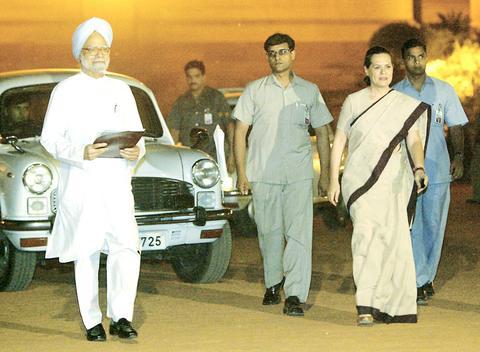Manmohan Singh, the soft-spoken economist named India's next prime minister, assured the nation yesterday that his new government would work to restore harmony among religions, remain investor-friendly and continue to seek peace with rival Pakistan.
"Unity and communal harmony are a priority," he said, calling on all "patriotic Indians" to shun Hindu-nationalist sentiments against Muslims and others.

PHOTO: AP
The party of outgoing Prime Minister Atal Bihari Vajpayee was widely accused of ignoring, and even stoking, deadly anti-Muslim riots in 2002 in the western state of Gujarat. The Bharatiya Janata Party also backed the construction a Hindu temple at the site of a 16th-century mosque razed by Hindu fanatics in 1992, setting off riots that left thousands dead.
"The essence of Hinduism is that parts may be different, but the goal is the same," said Singh, speaking in both Hindi and English.
"We are the most tolerant civilization in the world -- that is our great heritage. We have to strengthen and build on that heritage. I seek the cooperation of all patriotic Indians," he said.
India's president named Singh prime minister late Wednesday night, ending a week of political turmoil in which Sonia Gandhi, the Italian-born widow at the head of India's most powerful political dynasty and largest party, declined to become prime minister.
Instead, the Congress party leader chose Singh, the 71-year-old former finance minister who was behind market reforms in the 1990s.
Singh said his swearing-in ceremony before the new Parliament was likely to be Saturday.
Today is the 13th anniversary of the assassination of Gandhi's husband, former prime minister Rajiv Gandhi, and she will spend the day in solitude with their two children, Rahul and Priyanka.
Wearing a white Nehru-collar shirt and a light blue, traditional Sikh turban, Singh addressed the nation shortly before the start of India's trading day. Stocks opened higher, though they later fell.
"The emergence of India as a major global economic power happens to be one such idea whose time has come," Singh said, adding that the economic reforms promoted by Vajpayee's National Democratic Alliance would continue.
"Reforms with a human face will be pursued," he said, adding that those economic reforms must not leave behind farmers, the rural poor and minority ethnic groups that the Congress party claimed were ignored by the Vajpayee's Hindu-nationalist party.
"The war against poverty and disease has to be carried on relentlessly and I pledge our government to remain steadfast in our commitment," Singh said.
"In the words of Mahatma, to build an India free from the fear of war, want and exploitation," he said.

A fire caused by a burst gas pipe yesterday spread to several homes and sent a fireball soaring into the sky outside Malaysia’s largest city, injuring more than 100 people. The towering inferno near a gas station in Putra Heights outside Kuala Lumpur was visible for kilometers and lasted for several hours. It happened during a public holiday as Muslims, who are the majority in Malaysia, celebrate the second day of Eid al-Fitr. National oil company Petronas said the fire started at one of its gas pipelines at 8:10am and the affected pipeline was later isolated. Disaster management officials said shutting the

US Vice President J.D. Vance on Friday accused Denmark of not having done enough to protect Greenland, when he visited the strategically placed and resource-rich Danish territory coveted by US President Donald Trump. Vance made his comment during a trip to the Pituffik Space Base in northwestern Greenland, a visit viewed by Copenhagen and Nuuk as a provocation. “Our message to Denmark is very simple: You have not done a good job by the people of Greenland,” Vance told a news conference. “You have under-invested in the people of Greenland, and you have under-invested in the security architecture of this

Japan unveiled a plan on Thursday to evacuate around 120,000 residents and tourists from its southern islets near Taiwan within six days in the event of an “emergency”. The plan was put together as “the security situation surrounding our nation grows severe” and with an “emergency” in mind, the government’s crisis management office said. Exactly what that emergency might be was left unspecified in the plan but it envisages the evacuation of around 120,000 people in five Japanese islets close to Taiwan. China claims Taiwan as part of its territory and has stepped up military pressure in recent years, including

UNREST: The authorities in Turkey arrested 13 Turkish journalists in five days, deported a BBC correspondent and on Thursday arrested a reporter from Sweden Waving flags and chanting slogans, many hundreds of thousands of anti-government demonstrators on Saturday rallied in Istanbul, Turkey, in defence of democracy after the arrest of Istanbul Mayor Ekrem Imamoglu which sparked Turkey’s worst street unrest in more than a decade. Under a cloudless blue sky, vast crowds gathered in Maltepe on the Asian side of Turkey’s biggest city on the eve of the Eid al-Fitr celebration which started yesterday, marking the end of Ramadan. Ozgur Ozel, chairman of the main opposition Republican People’s Party (CHP), which organized the rally, said there were 2.2 million people in the crowd, but